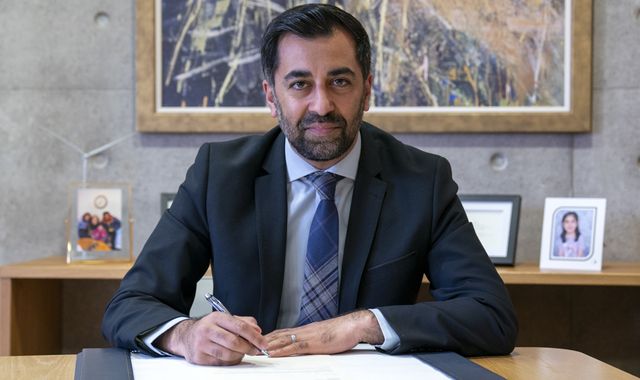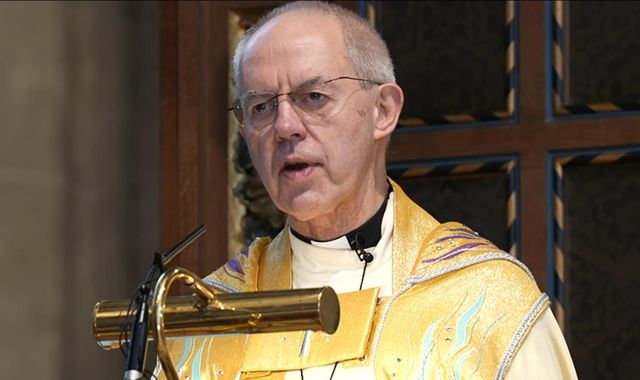Humza Yousaf formally resigns as Scotland's first minister with letter to King
7 May 2024, 09:40 | Updated: 7 May 2024, 15:10

Humza Yousaf has formally tendered his resignation as Scotland's first minister to the King.
It now paves the way for MSPs to vote on who should take his place, with new SNP leader John Swinney expected to win Holyrood's backing.
The vote is expected to take place at the Scottish parliament later on Tuesday.
In his letter to the King, Mr Yousaf wrote: "With my humble duty, I write as anticipated in my letter to Your Majesty of 29 April to tender to Your Majesty my resignation from the office of first minister.
"I propose that my resignation take effect from the start of Scottish parliamentary plenary business on Tuesday 7 May 2024.
"Throughout my time as first minister, I have been most grateful for your counsel and the kindness you have shown to both Nadia and I.
"It has been my pleasure to serve Your Majesty and the people of Scotland since March 2023."
Following his resignation, Mr Yousaf said: "Being the first minister of the country I love, the country I am raising my family in, and the only country I will ever call home has been a phenomenal honour.
"As a young Muslim boy, born and raised in Scotland, I could never have dreamt that one day I would have the privilege of leading my country - people who looked like me were not in positions of political influence, let alone leading governments when I was younger.
"I am proud to have delivered a council tax freeze for households in every local authority in Scotland, invested record amounts in our National Health Service, removed peak fares on our railways, and approved plans for Europe's largest floating offshore windfarm.
"And through our actions, an estimated 100,000 children are expected to be kept out of poverty this year.
"From the backbenches of the Scottish parliament, I will continue to champion the rights and the voices of those who are often not heard, be they at home or abroad."
Mr Yousaf was forced to step down after terminating the Bute House Agreement with the Scottish Greens.
Within hours of the power-sharing deal coming to an end, Scottish Tory leader Douglas Ross announced he would be bringing a motion of no confidence in the first minister.
Angry over the way the party was dumped from government, the Scottish Greens announced its MSPs would be backing the motion.
Scottish Labour then announced it was planning a motion of no confidence in the Scottish government.
Mr Yousaf reached out to his political opponents in an effort to stem the uprising but conceded that he had "underestimated the level of hurt and upset" his actions had caused Scottish Green colleagues.
After Mr Yousaf resigned, Mr Ross dropped his motion.
Scottish Labour pressed on but the party was defeated in a vote following a debate at Holyrood last week.
Mr Swinney, who was deputy first minister under Nicola Sturgeon, is now expected to succeed Mr Yousaf.
Read more:
Who is John Swinney?
Mr Swinney was unopposed in the SNP leadership contest and promised a "new chapter" for the party as he pledged to use "respect and courtesy" to make the case for Scottish independence.
Responding to questions after his post-win speech on Monday, Mr Swinney confirmed he will not be reinstating the Bute House Agreement with the Scottish Greens, preferring to take issues on a case-by-case basis.
If elected by MSPs and once officially sworn-in at the Court of Session in Edinburgh, Mr Swinney will then be able to appoint his cabinet.
(c) Sky News 2024: Humza Yousaf formally resigns as Scotland's first minister with letter to King

























